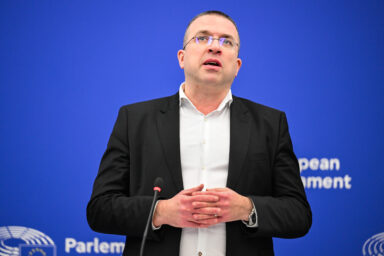Thirteen EU member states have joined forces to push for a leaner, more innovation-friendly Europe. In the newly adopted Lisbon Declaration, the signatories call on the European Commission to cut red tape, simplify digital regulations, and modernise public administration — all to strengthen the EU’s in digital economy competitiveness.
Czech representative Jan Kavalírek, the government envoy for artificial intelligence, welcomed the initiative but noted that it could have gone even further. “It’s a clear call for simplification. Personally, I would have liked to see an even more ambitious appeal, but it’s a good compromise,” he said.
“Europe stands at a crucial crossroads in shaping its digital and economic future,” the thirteen ministers wrote in their joint statement. “Digital transformation is not only a driver of growth but also a cornerstone of Europe’s strategic autonomy, social cohesion, and sustainable development. The coming years will be decisive for harnessing advanced technologies, empowering citizens and businesses, and ensuring prosperity and security.”
Europe at a digital crossroads
Thirteen countries joined the call: Belgium, Czechia, Denmark, Estonia, Finland, Ireland, Luxembourg, the Netherlands, Poland, Portugal, Slovakia, Spain, and Sweden. At their meeting in Lisbon last week, the ministers urged the Commission to streamline regulations and reduce bureaucratic burdens in the digital sector. They referred specifically to the forthcoming Digital Omnibus — a simplification package currently being prepared by the Commission and expected to be unveiled before the end of the year.
“Legislative frameworks should reflect the needs of businesses, including SMEs and startups, and remove duplicative reporting obligations,” the declaration states.
You might be interested
The document also calls for closer coordination between EU countries to ensure consistent application of digital rules, modernisation of public services through technology, and greater investment in artificial intelligence and digital skills.
A Message for Brussels
The Lisbon Declaration has been sent to the European Commission’s Directorate-General for Communications Networks, Content and Technology (DG CONNECT), as well as to the permanent representations of all 27 EU member states in Brussels. Its goal: to steer the Commission’s upcoming proposals toward a stronger focus on competitiveness at a time when the EU is facing growing criticism for overregulation.
“We need to dramatically increase spending on science and research,” Mr Kavalírek emphasised. “If we want to catch up with the United States, China, or the United Arab Emirates — all of whom invest more than we do — we must significantly boost our investment. Europe has lost its position as a technological leader, and we need to regain it.”
Each participating country contributed its own priorities to the Lisbon discussions. Estonia and Luxembourg, for example, both advocate for a smarter, more coherent approach rather than blanket deregulation. Tallinn highlights the need for streamlined cybersecurity reporting, proportional obligations under the updated NIS directive, and greater legal clarity in data sharing — arguing that simpler, harmonised rules would help startups and SMEs thrive.
13 countries, 13 priorities
Luxembourg, meanwhile, champions the principle of “better regulation”, urging the Commission to focus on implementation rather than continuous law-making. It warns that excessive layering of legislation risks undermining Europe’s digital competitiveness and calls for clearer coordination between the GDPR, AI Act, and Data Act, along with a “one principle, one report” model to cut administrative burdens.
The Czech Republic called for simplifying the EU’s AI Act and postponing its application by twelve months after the publication of implementation guidelines. Prague argued that clearer rules and consistent interpretation across member states are essential to avoid legal uncertainty and unnecessary burdens on businesses.
“This is the moment when manufacturers are assessing the costs of compliance. Once the system is in motion, it will be too late,” said Czech AI envoy Jan Kavalírek, warning that premature regulation could slow innovation.
‘Europe Is Losing Ground’
Parallel to the ministers’ meeting, representatives of the business community also gathered in Lisbon. Their message was blunt: “Companies are moving to the US, where they have better conditions.”
The European Commission is expected to present its concrete simplification proposals later this year. They will then be discussed by the European Parliament and the Council of Ministers. However, negotiations may not be straightforward — while some member states prioritise the protection of European values and standards, others argue that simplification cannot wait.











